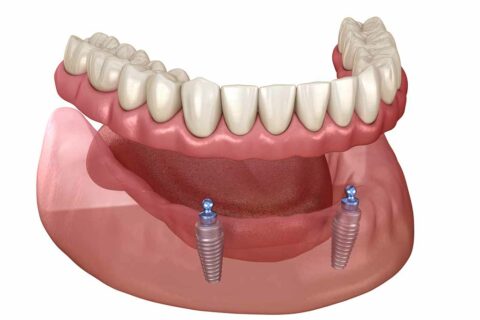Removable dentures (partial or complete) have been a staple of dental care for decades. One of the most common complaints about dentures, lower dentures in particular, is that they are difficult to keep in place. Fortunately, with the advances in dental implant technology, we not only use implants to replace missing teeth, but we can use implants to anchor on dentures. Hence, a denture held in place either entirely or in part by dental implants is known as an implant denture.
What is an implant denture?
An implant denture is a regular denture that has special attachments built in which allow it to connect to dental implants below. A common example is to use two dental implants in the bottom jaw in the area of where each of the canines (“eye-teeth”) would be. The denture is then made to snap on to these two dental implants.
What are the advantages of an implant denture?
The advantages of an implant denture include significantly increased stability compared to a denture that’s not retained by implants. And because implant dentures fit securely in place, patients are much more comfortable speaking, smiling and eating, as there is very little chance that a properly fit implant denture will come out of the mouth.
What are the disadvantages of implant dentures?
The disadvantages of having an implant denture fabricated is the time needed to have the implants placed and have the implants osseointegrate (heal), as well as the cost of the implants and the expense of having the denture designed to work with dental implants. That being said, if you consider the time people spend with relines, denture adhesives, and with the frustrations that go with a lower complete denture, the benefits of having an implant denture greatly outweigh the disadvantages.

